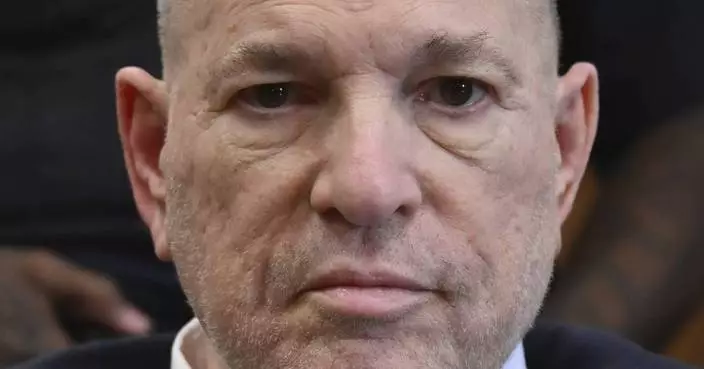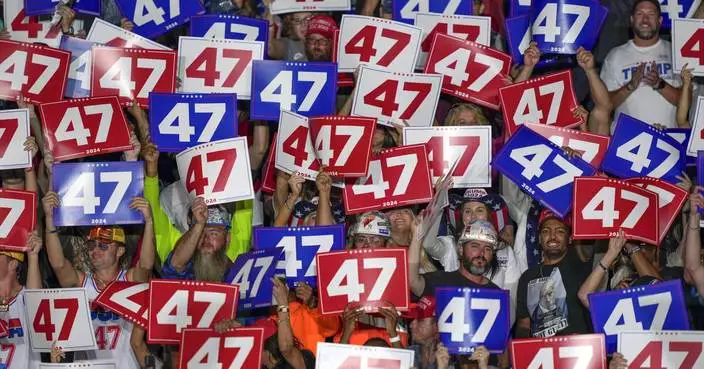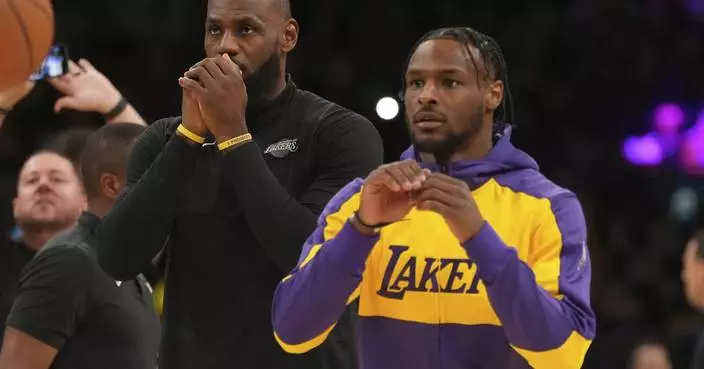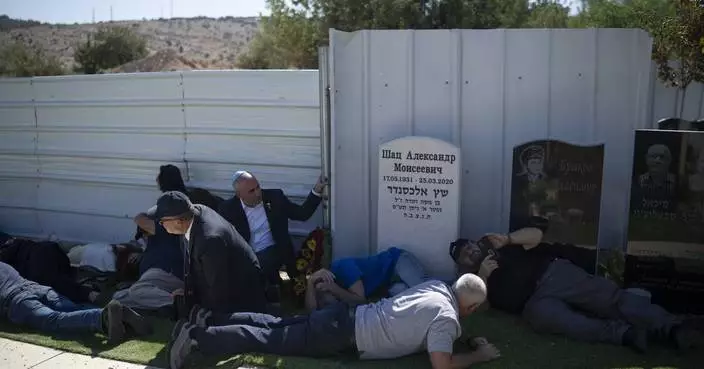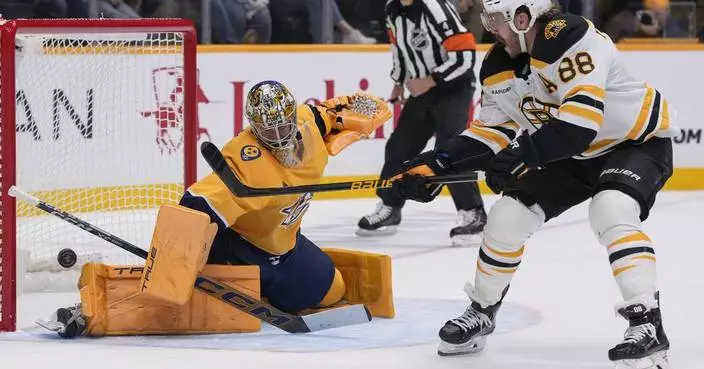VIENNA (AP) — Tens of thousands of devastated Swifties trading friendship bracelets, wearing sparkly dresses and singing songs in the streets of Vienna. Workers taking down the Taylor Swift stage inside an empty stadium.
This was the scene at the beginning of August in the Austrian capital after organizers abruptly canceled Swift’s three shows over threats of an attack by Islamic State group militants.
Intelligence-sharing was instrumental in preventing a tragedy, Austrian and U.S. officials said. But it relies on mutual trust — confidence that secrets will not fall into the wrong hands or be leaked to hostile governments.
Austria’s Western allies have grown increasingly worried about this possibility in recent weeks. The country’s political parties have maintained an openness to Russia for decades — part of a traditional foreign policy of neutrality — but none more so than the far-right Freedom Party, which secured the largest share of the vote in last month’s national elections.
If the Freedom Party is part of Austria’s next government, some analysts warn that intelligence-sharing could be drastically restricted, if not stopped altogether.
For now, the center-right People’s Party has a mandate to form a governing coalition. Negotiations will be held in the weeks and months ahead without the Freedom Party since the conservatives and all other parties have ruled out governing with the far right. But if those negotiations fail, the Freedom Party will be waiting in the wings.
This story, supported by the Pulitzer Center for Crisis Reporting, is part of an ongoing Associated Press series covering threats to democracy in Europe.
Austrian and U.S. officials confirmed that intelligence-sharing was instrumental in preventing a tragedy. But that kind of exchange of information relies on mutual trust – confidence that secrets will not fall into the wrong hands or be leaked to hostile governments. In the case of the U.S. and most of the EU, those hostile governments include Russia.
In February 2018, when Freedom Party leader Herbert Kickl was interior minister, several foreign intelligence services cut Austria out from intelligence sharing as a result of a police raid that his ministry ordered on its own domestic intelligence agency.
The raid, which was ruled illegal by an Austrian court in August 2018,shocked the country. It prompted a parliamentary inquiry and led to the agency being shut down.
It is still unclear if or to what extent Russia could have pulled the strings.
Beate Meinl-Reisinger, who heads the liberal Neos party in Austria, told a news conference in May that Kickl and the Freedom Party in 2018 either knowingly agreed to work for Russia’s interests or acted as “useful idiots.”
The parliamentary inquiry found that senior officials at the Ministry of Interior, at the time headed by Kickl, played an active role by using accusations against senior government and intelligence officials in an anonymous dossier to push prosecutors to sign off on the raid. Kickl has denied any wrongdoing.
The accusations in the dossier, including corruption, the mishandling of sensitive data and sexual harassment, went up in smoke, but after four years of investigation, it’s still not clear who compiled and leaked the document.
Austrian media report that investigators are pursuing whether Egisto Ott, a disgruntled former intelligence official suspected of spying for Russia, may have compiled the dossier in an effort to undermine the intelligence service, possibly because of his own frustrations with the agency.
Green Party lawmaker David Stögmüller said that by pushing for the raid, the Freedom Party “wanted to smash the domestic intelligence agency and create something new with faces close to their own party.”
The party’s alleged attempts to reshape the domestic intelligence agency were only disrupted after its then-leader was forced to resign after being caught on video apparently offering public contracts in return for campaign donations
The raid’s repercussions are still being felt. German lawmakers have said their government should review its cooperation with Austria if the Freedom Party is part of the new government.
“In light of the massive danger posed by Russia to peace and stability in Europe, we cannot allow relevant information to be handed over directly to Russia,” Konstantin Kuhle from the liberal FDP and a member of the intelligence oversight committee in the German parliament told German newspaper Handelsblatt earlier this month.
“Should the far-right Freedom Party become part of the next government and be given control over the intelligence agencies again, the trust of foreign intelligence services will certainly be up for debate again,” said Thomas Riegler, an espionage expert affiliated with the Austrian Center for Intelligence, Propaganda and Security Studies.
Among the items seized in the illegal 2018 raid was a copy of the so-called Neptune Database — a hard drive containing sensitive information shared by foreign intelligence agencies with Austria.
“The mistrust foreign partners have of the Freedom Party is rooted in the party’s relationship with Russia,” Rieger said.
The Freedom Party calls for an end to sanctions against Russia. It is critical of Western military aid to Ukraine, and signed a friendship agreement in 2016 with Putin’s United Russia Party that it now claims has expired.
But the Freedom Party is not the only one to have enabled Russian influence. Mainstream parties have also played their part, at the risk of undermining Austrian and European security. This has a lot to do with Austria’s post-war history.
Austria, which was annexed by Nazi Germany in the run-up to World War II, declared neutrality after the war under pressure from Western allies and the Soviet Union. It sought a role as a mediator between East and West, developing ties with Moscow that outlasted the Cold War.
“Austria’s neutrality, the many international organizations in Vienna, its geostrategic location and lenient espionage laws all have turned Austria into a hotbed for Russian and other espionage,” Riegler said.
Espionage is only explicitly banned if directed against Austria itself, not if it targets other countries or international organizations.
Since 2020, 11 Russian diplomats suspected of spying have been told to leave Austria. In contrast, Germany closed down four out of five Russian consulates last year.
As of March 2024, Russia had 142 diplomats and 116 administrative and technical personnel accredited in Austria. Approximately 25% are likely spies, said an Austrian intelligence official, who requested anonymity to discuss the sensitive topic.
The true number is likely higher: it may include diplomats’ relatives and employees of semi-official institutions such as schools, airlines offices or media organizations, the official added.
“The reluctance of the Austrian Foreign Ministry to expel more Russian diplomats is a scandal and poses a security risk for the country,” said Stephanie Krisper, whose NEOS party champions a tougher stance towards Russia.
Austria’s foreign ministry says the number of Russian diplomats expelled is “in the median of the European field.”
In a written response to The Associated Press, Foreign Minister Alexander Schallenberg said: “My position is very clear: International law is the basis of my actions. As the first Austrian Foreign Minister ever, I have not shied away from taking appropriate measures and expelled diplomats whenever it is brought to my attention that they have engaged in acts incompatible with their diplomatic status.”
But in its 2023 annual report, Austria’s domestic intelligence agency DSN emphasized the danger of Russian and other espionage. Radar and satellite installations on the roofs of Russian diplomatic representations in Vienna are used for gathering intelligence on European NATO states, it said, thereby leading to a “loss of reputation” for Austria.
“Austria lets espionage happen on its soil that is directed against the security interests and values of European and other partner states,” said a senior European diplomat who requested anonymity to discuss the sensitive topic.
Given the historical connections between Austria and Russia, the situation is unlikely to change much, no matter who is in the next government, the diplomat said.
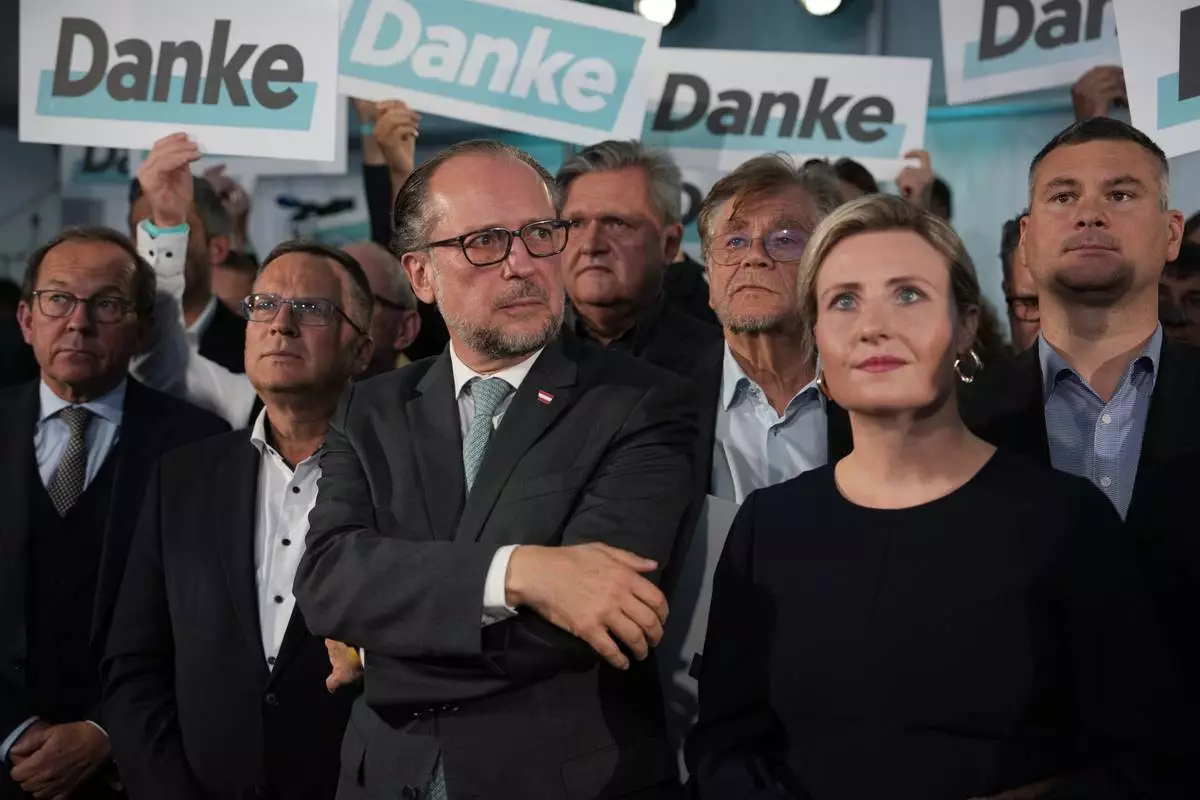
FILE - Austria's Foreign Minister Alexander Schallenberg, center left, and Susanne Raab of the at the OVP, Austrian People's Party, look on as supporters hold "Thank You" banners at the party headquarters in Vienna, Austria, Sunday, Sept. 29, 2024, after seeing the first electoral projections in the country's national election. (AP Photo/Andreea Alexandru, File)
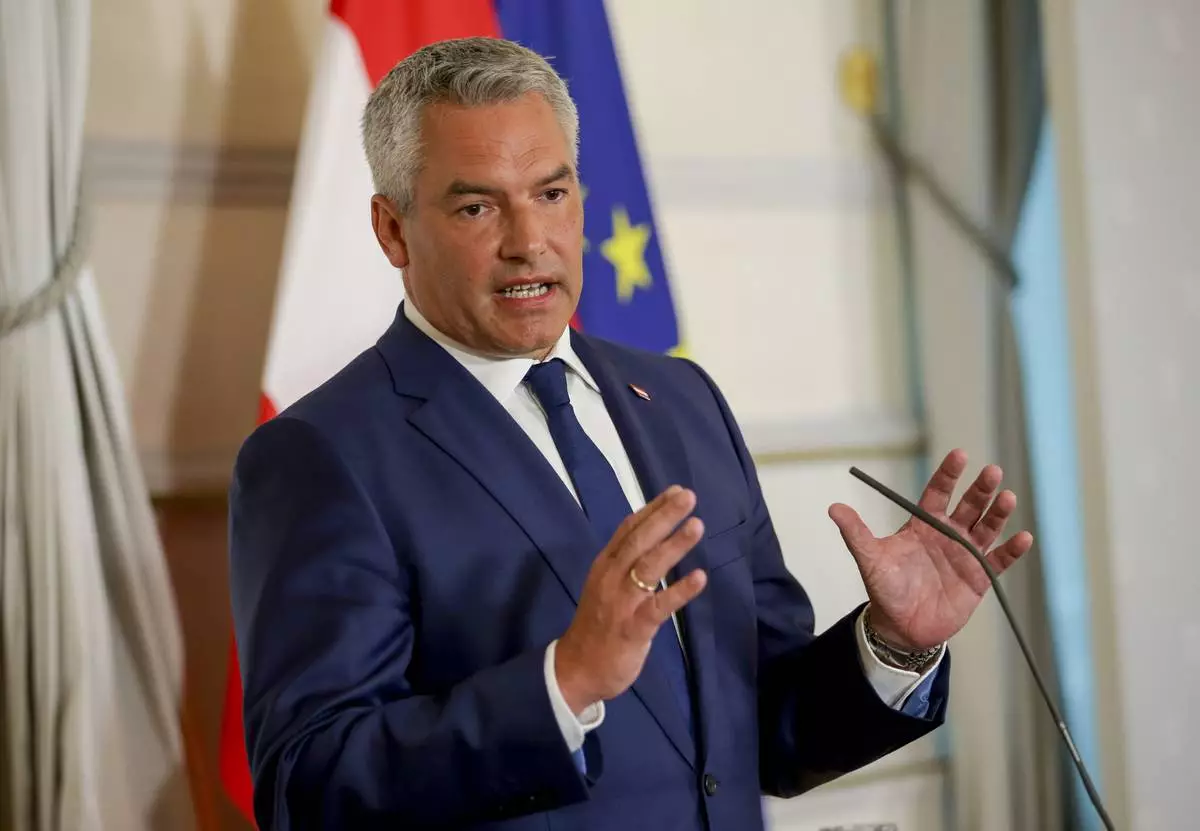
FILE - Austrian Chancellor Karl Nehammer attends a press conference in Vienna on Thursday, Aug. 8, 2024. (AP Photo/Heinz-Peter Bader, File)

FILE - Swifties trade bracelets in the city centre in Vienna Thursday, Aug. 8, 2024, the day after organizers of three Taylor Swift concerts in the stadium in Vienna this week called them off after officials announced arrests over an apparent plot to launch an attack on an event in the Vienna area such as the concerts. (AP Photo/Heinz-Peter Bader, File)

FILE - Herbert Kickl, leader of the Freedom Party of Austria waves to supporters, in Vienna, Austria, Sunday, Sept. 29, 2024, after polls closed in the country's national election. (AP Photo/Andreea Alexandru, File)
LOS ANGELES (AP) — Fernando Valenzuela, the Mexican-born phenom for the Los Angeles Dodgers who inspired “Fernandomania” while winning the NL Cy Young Award and Rookie of the Year in 1981, has died. He was 63.
The team said he died Tuesday night at a Los Angeles hospital, but did not provide the cause or other details.
His death comes as the Dodgers prepare to open the World Series on Friday night at home against the New York Yankees. Baseball Commissioner Rob Manfred said Valenzuela would be honored during the series at Dodger Stadium.
Valenzuela had left his color commentator job on the Dodgers’ Spanish-language television broadcast in September without explanation. He was reported to have been hospitalized earlier this month. His job kept him as a regular at Dodger Stadium, where he held court in the press box dining room before games and remained popular with fans who sought him out for photos and autographs.
“God bless Fernando Valenzuela!” actor and Dodgers fan Danny Trejo posted on X.
Valenzuela was one of the most dominant players of his era and a wildly popular figure in the 1980s, although he was never elected to the Baseball Hall of Fame. However, he is part of Cooperstown, which features several artifacts including a signed ball from his no-hitter in 1990.
“He is one of the most influential Dodgers ever and belongs on the Mount Rushmore of franchise heroes," Stan Kasten, team president and CEO, said in a statement. “He galvanized the fan base with the Fernandomania season of 1981 and has remained close to our hearts ever since, not only as a player but also as a broadcaster. He has left us all too soon.”
Valenzuela's rise from humble beginnings as the youngest of 12 children in Mexico and his feats on the mound made him hugely popular and influential in Los Angeles’ Latino community while helping attract new fans to Major League Baseball. Their fondness for him continued for years after his retirement.
“63 is way too young.... A piece of my childhood is gone,” actor and “Access Hollywood” co-host Mario Lopez posted on X. “Growing up as a Mexican kid one of the main reasons I'm a Dodgers fan is because of Fernando. ... Not only a great player, but a great man to the community. What a legend.”
In 1981, Valenzuela became the Dodgers’ opening day starter as a rookie after Jerry Reuss was injured 24 hours before his scheduled start. He shut out the Houston Astros 2-0 and began the season 8-0 with five shutouts and an ERA of 0.50. He became the first player to win a Cy Young and Rookie of the Year in the same season.
His performances created the delirium known as “Fernandomania” among Dodgers fans. The ABBA hit “Fernando” would play as he warmed up on the mound.
He was 13-7 and had a 2.48 ERA in his first season, which was shortened by a players’ strike.
Valenzuela was an All-Star selection every year from 1981-86, when he recorded 97 victories, 84 complete games, 1,258 strikeouts and a 2.97 ERA. He was 5-1 with a 2.00 ERA in eight postseason starts. He earned two Silver Slugger Awards and a Gold Glove.
Valenzuela’s no-hitter on June 29, 1990, a 6-0 victory over the St. Louis Cardinals at Dodger Stadium, was an emotional career highlight. He struck out seven and walked three.
“If you have a sombrero, throw it to the sky!” Hall of Fame broadcaster Vin Scully exclaimed in his game call.
Nicknamed “El Toro” by the fans, Valenzuela had an unorthodox and memorable pitching motion that included looking skyward at the apex of each windup. His repertoire included a screwball -- making him one of the few pitchers of his era who threw that pitch regularly. It was taught to him by teammate Bobby Castillo after the Dodgers felt Valenzuela, who wasn’t known as a hard thrower, needed another pitch.
Early in his Dodgers career, Valenzuela spoke little English and had trouble communicating with his catchers. Rookie Mike Scioscia learned Spanish and became Valenzuela’s personal catcher before becoming the team’s full-time catcher.
Valenzuela was a better-than-average hitter, with 10 career home runs.
Eventually, his pitching was compromised by nagging shoulder problems that kept him out of the 1988 postseason, when the Dodgers won the World Series.
The team released Valenzuela just before the 1991 season. He also pitched for the former California Angels, Baltimore Orioles, Philadelphia Phillies, San Diego Padres and St. Louis Cardinals.
He retired in 1997, going 141-116 with a 3.31 ERA in 11 seasons with the Dodgers. Overall, he was 173-153 with a 3.54 ERA in 17 seasons.
Valenzuela’s rise from his tiny hometown of Etchohuaquila in the Mexican state of Sonora to stardom in the U.S. was improbable. He was the youngest child in a large family who tagged along when his older brothers played baseball.
He signed his first pro contract at age 16, and soon began overpowering older players in the Mexican Central League.
In 1978, legendary Dodgers scout Mike Brito was in Mexico to watch a shortstop when Valenzuela entered the game as a reliever. He immediately commanded Brito’s attention and at age 18, Valenzuela signed with the Dodgers in 1979. He was sent to the California League that same year.
In 1980, Valenzuela was called up to the Dodgers in September and soon made his big league debut as a reliever.
He remains the only pitcher in MLB history to win the Cy Young and Rookie of the Year awards in the same season. The left-hander was the National League’s starting pitcher in the All-Star Game in 1981, the same year the Dodgers won the World Series.
He is the all-time major league leader in wins (173) and strikeouts (2,074) by a Mexican-born player.
During his career, he made the cover of Sports Illustrated and visited the White House.
In 2003, Valenzuela returned to the Dodgers as the Spanish-language radio color commentator for NL games. Twelve years later, he switched to the color commentator job on the team’s Spanish-language TV feed.
“He consistently supported the growth of the game through the World Baseball Classic and at MLB events across his home country,” Manfred said in a statement. “As a member of the Dodger broadcasting team for more than 20 years, Fernando helped to reach a new generation of fans and cultivate their love of the game. Fernando will always remain a beloved figure in Dodger history and a special source of pride for the millions of Latino fans he inspired.”
He was inducted into the Mexican Professional Baseball Hall of Fame in 2014. Five years later, the Mexican League retired Valenzuela’s No. 34 jersey. The Dodgers followed in 2023 after keeping his number out of circulation since he last pitched for the team in 1991. The team has a rule that requires a player to be in the Baseball Hall of Fame before having the Dodgers retire his number, but they made an exception for Valenzuela.
The Dodgers named Valenzuela as part of the “Legends of Dodger Baseball” in 2019 and inducted him into the team’s Ring of Honor in 2023.
He became a U.S. citizen in 2015.
Valenzuela served on the coaching staff for Mexico during the World Baseball Classic in 2006, 2009, 2013 and 2017. He was a part-owner of the Mexican League team Tigres de Quintana Roo, with son Fernando Jr. serving as team president and son Ricky serving as general manager. Fernando Jr. played in the San Diego Padres and Chicago White Sox organizations as a first baseman.
In addition to his sons, he is survived by his wife, Linda, who was a schoolteacher from Mexico whom he married in 1981, and daughters Linda and Maria as well as seven grandchildren.
AP MLB: https://apnews.com/hub/MLB
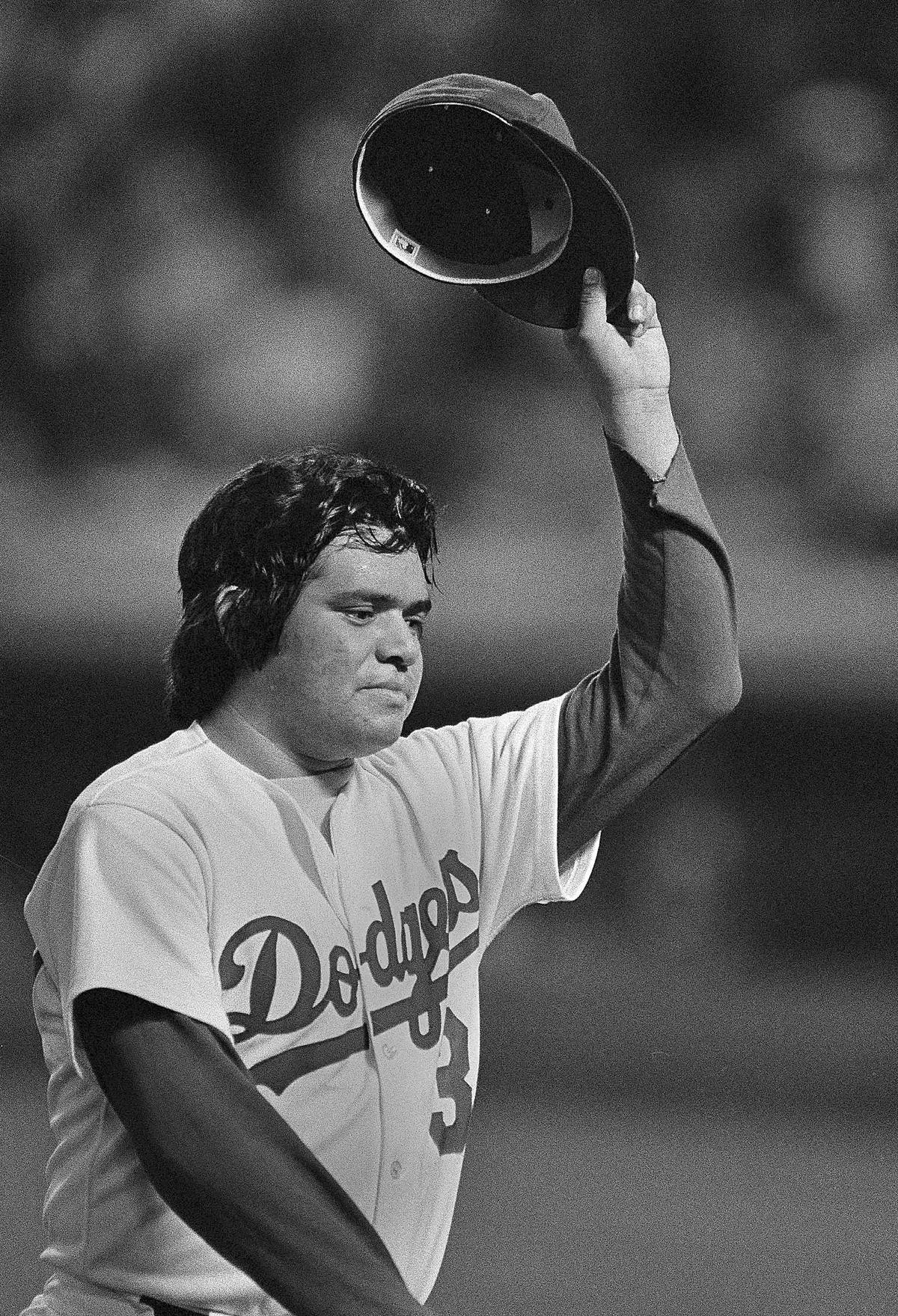
FILE - Los Angeles Dodger pitching sensation Fernando Valenzuela tips his hat to the crowd celebrating his equaling the major league record of eight shutouts by a rookie during a baseball game against the Atlanta Braves, Sept. 18, 1981, in Los Angeles. Fernando Valenzuela, the Mexican-born phenom for the Los Angeles Dodgers who inspired “Fernandomania” while winning the NL Cy Young Award and Rookie of the Year in 1981, has died Tuesday, Oct. 22, 2024.(AP Photo/Molenhouse, File)
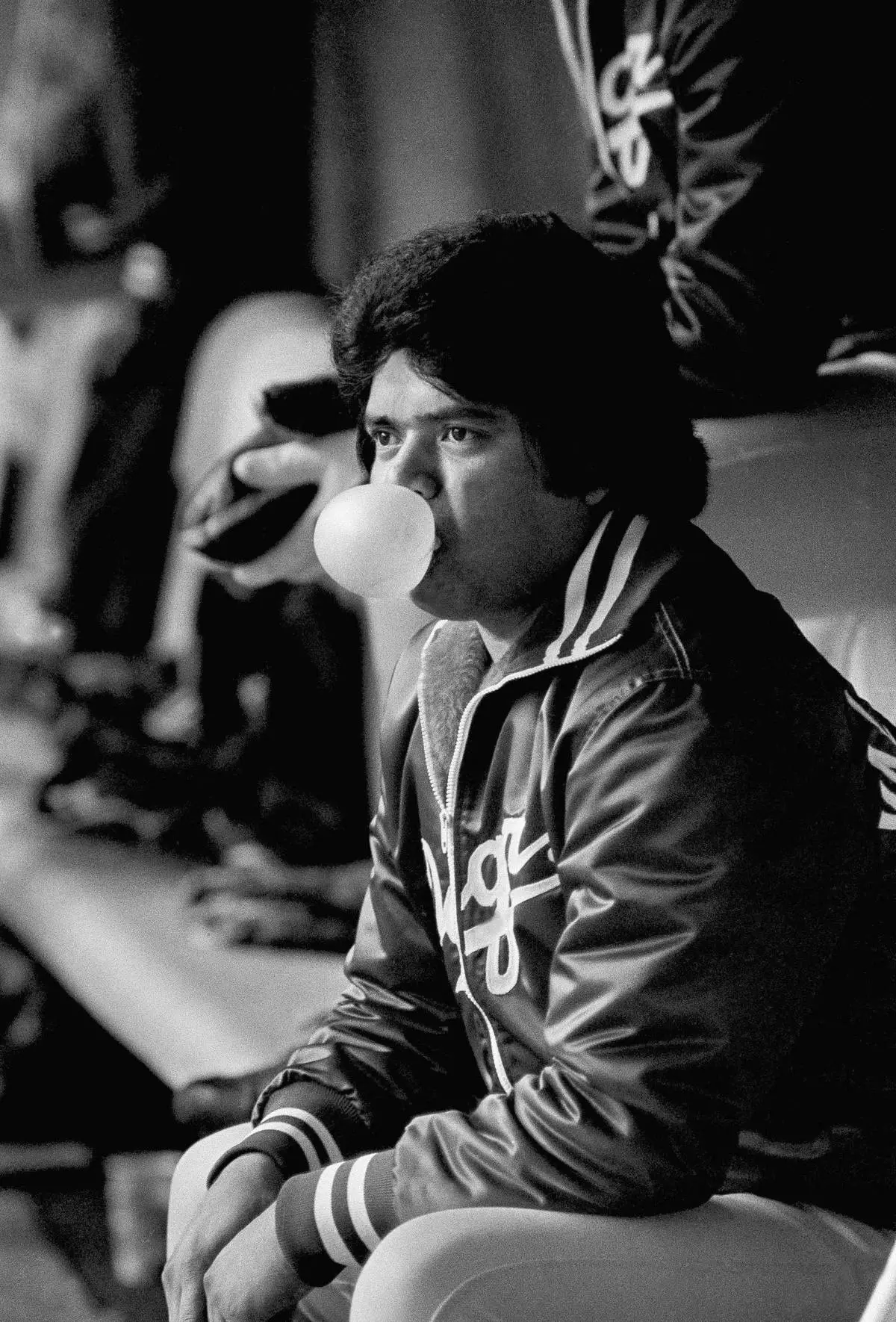
FILE - Los Angeles Dodgers pitcher Fernando Valenzuela blows bubbles as he passes the time in the dugout during the rain delay before Game 3 of the National League playoffs with the Expos at Montreal, Oct. 18, 1981. Fernando Valenzuela, the Mexican-born phenom for the Los Angeles Dodgers who inspired “Fernandomania” while winning the NL Cy Young Award and Rookie of the Year in 1981, has died Tuesday, Oct. 22, 2024.(AP Photo/Rusty Kennedy, File)
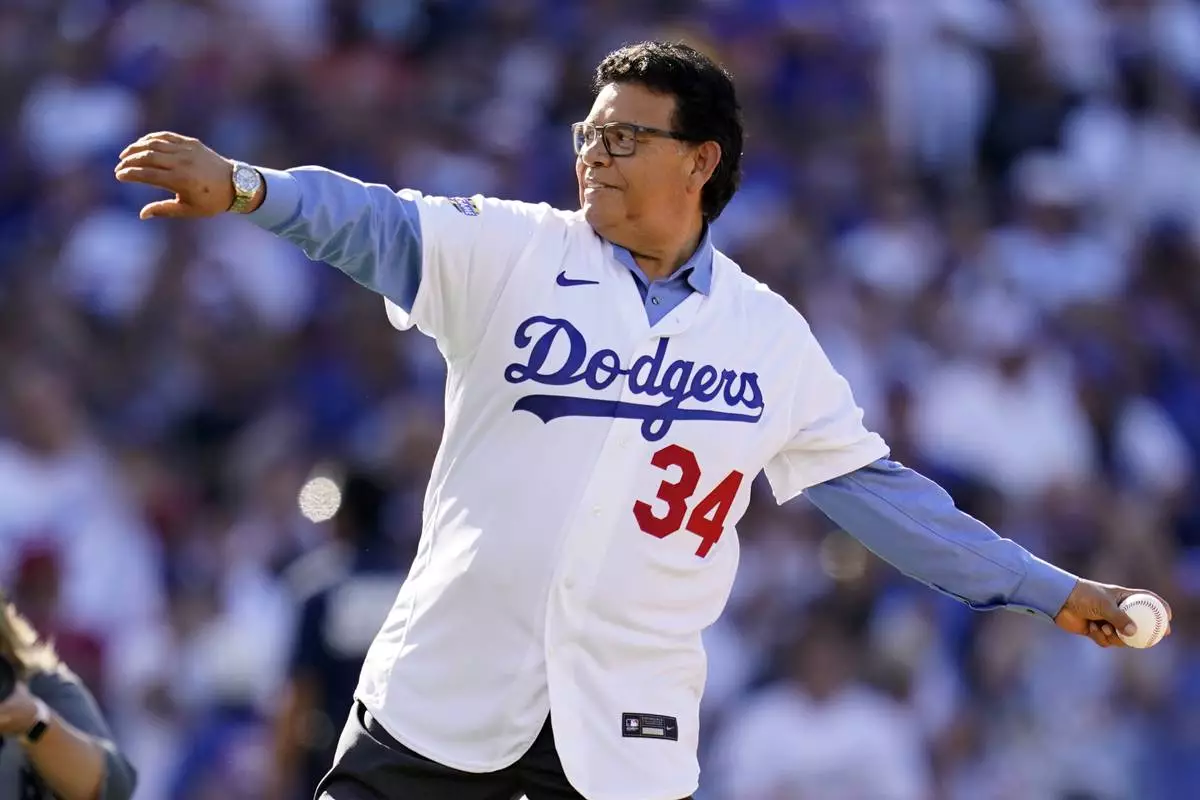
FILE - Former Los Angeles Dodgers pitcher Fernando Valenzuela throws the ceremonial first pitch during the MLB All-Star baseball game, July 19, 2022, in Los Angeles. Fernando Valenzuela, the Mexican-born phenom for the Los Angeles Dodgers who inspired “Fernandomania” while winning the NL Cy Young Award and Rookie of the Year in 1981, has died Tuesday, Oct. 22, 2024.(AP Photo/Abbie Parr, File)
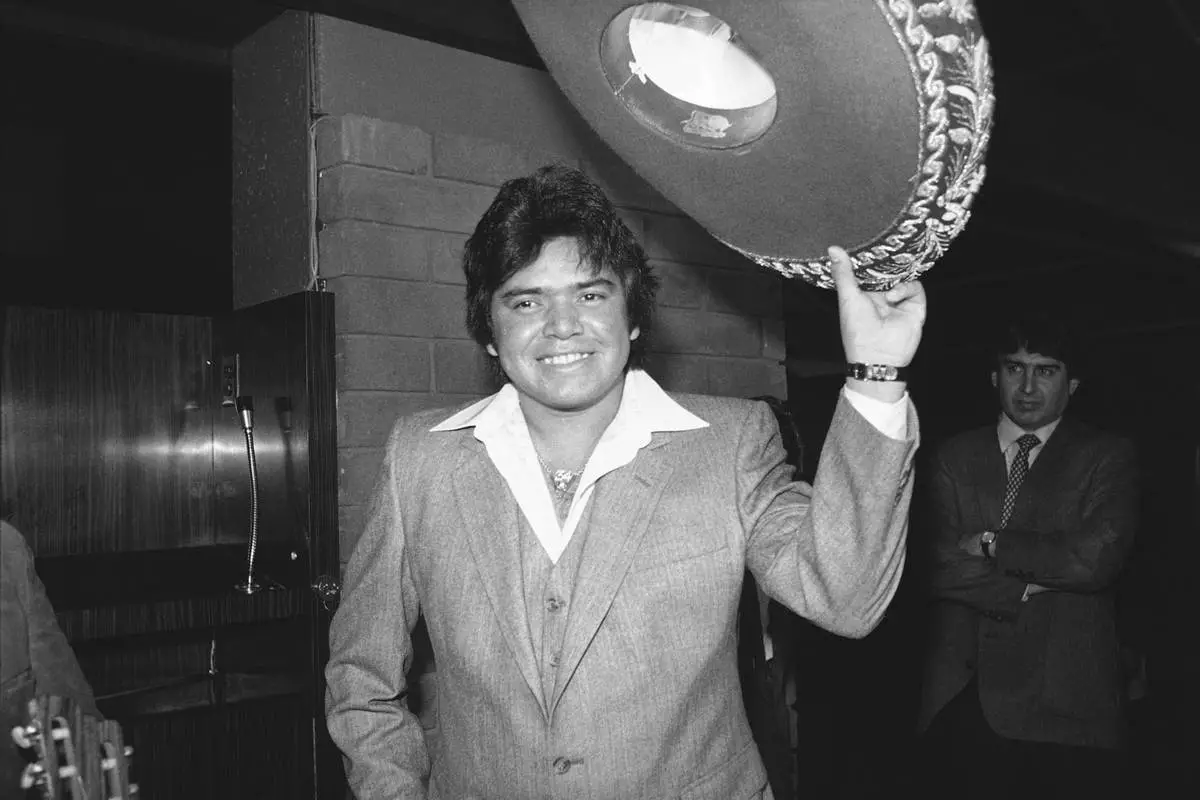
FILE - Los Angeles Dodger pitcher Fernando Valenzuela tips his sombrero at a news conference after he was named National League Rookie of the Year, Dec. 2, 1981, in Los Angeles. Fernando Valenzuela, the Mexican-born phenom for the Los Angeles Dodgers who inspired “Fernandomania” while winning the NL Cy Young Award and Rookie of the Year in 1981, has died Tuesday, Oct. 22, 2024.(AP Photo/Wally Fong, File)
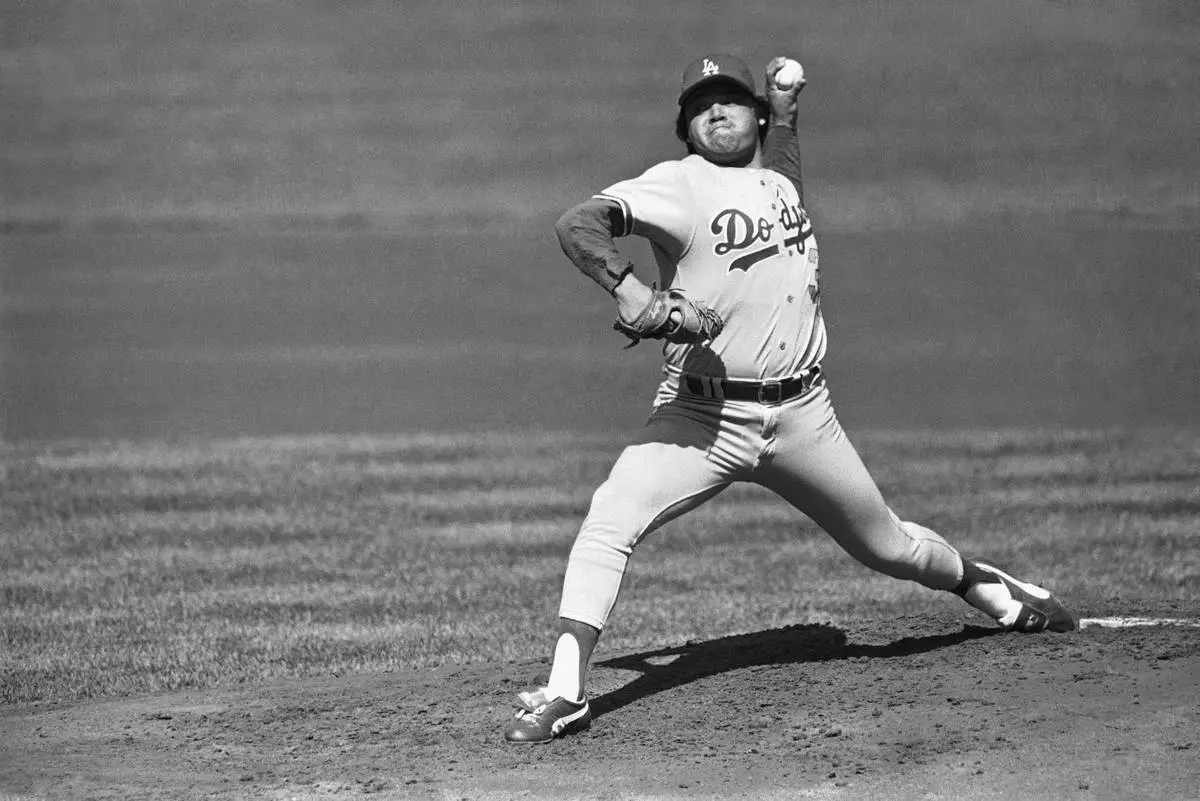
FILE - Los Angeles Dodgers pitcher Fernando Valenzuela pitches against a San Francisco Giants batter during the first inning at Candlestick Park, Oct. 3, 1982, in San Francisco. Fernando Valenzuela, the Mexican-born phenom for the Los Angeles Dodgers who inspired “Fernandomania” while winning the NL Cy Young Award and Rookie of the Year in 1981, has died Tuesday, Oct. 22, 2024. (AP Photo, File)
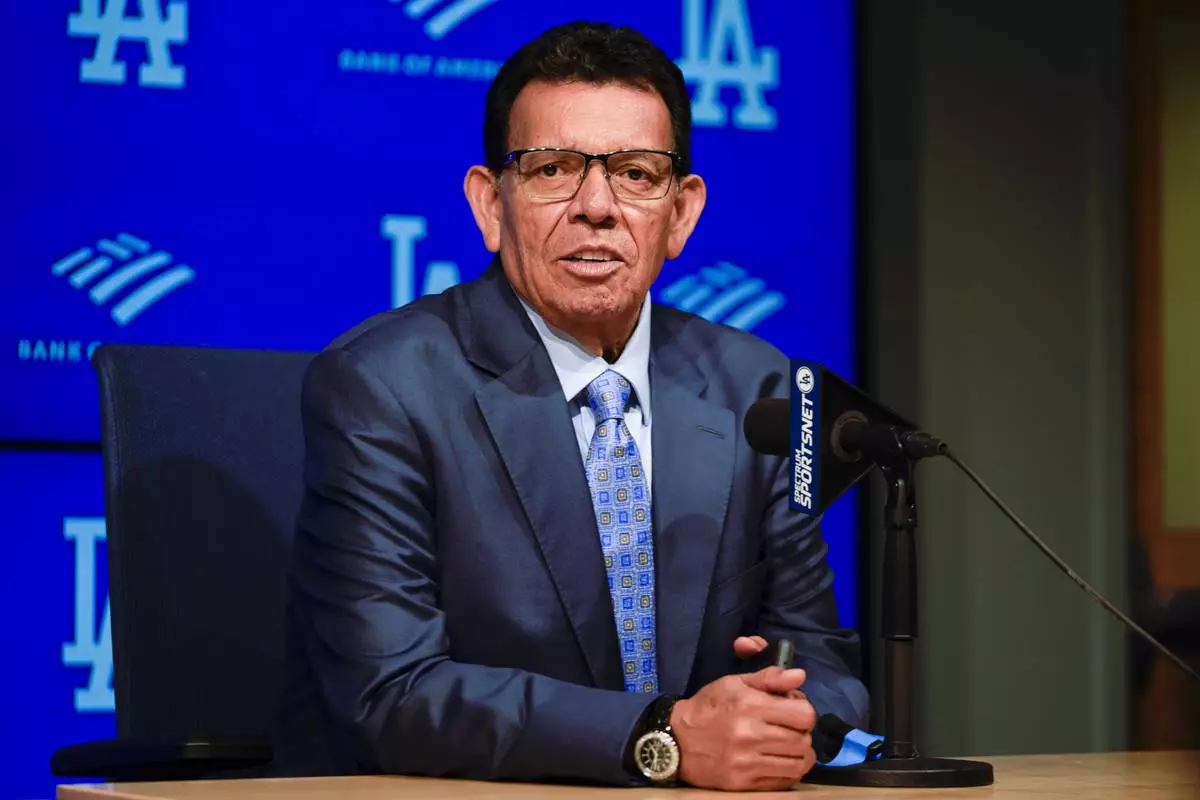
FILE - Former Los Angeles Dodgers pitcher Fernando Valenzuela speaks during a news conference ahead of his jersey retirement ceremony at a baseball game between the Dodgers and the Colorado Rockies, Aug. 11, 2023, in Los Angeles. Fernando Valenzuela, the Mexican-born phenom for the Los Angeles Dodgers who inspired “Fernandomania” while winning the NL Cy Young Award and Rookie of the Year in 1981, has died Tuesday, Oct. 22, 2024. (AP Photo/Ryan Sun, File)
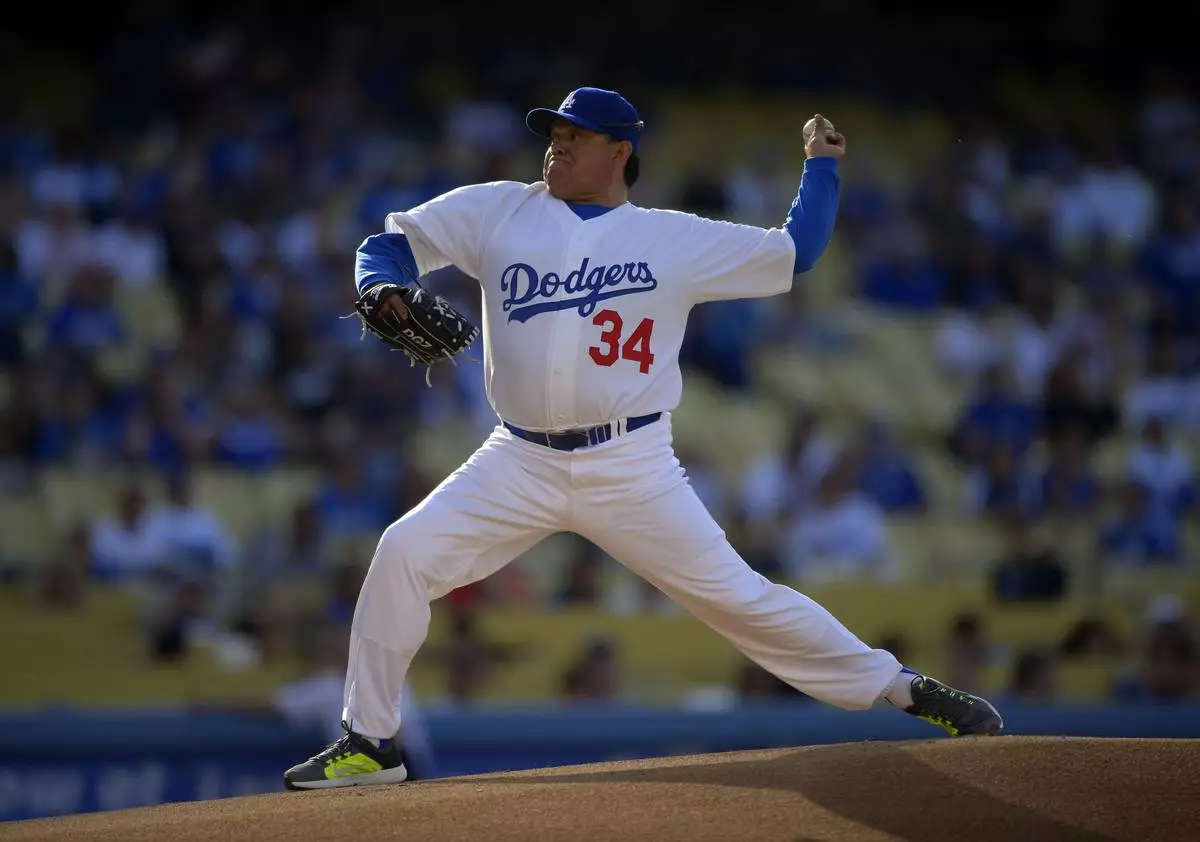
FILE - Fernando Valenzuela throws to the plate during the Old-Timers baseball game, June 8, 2013, in Los Angeles. Fernando Valenzuela, the Mexican-born phenom for the Los Angeles Dodgers who inspired “Fernandomania” while winning the NL Cy Young Award and Rookie of the Year in 1981, has died Tuesday, Oct. 22, 2024. (AP Photo/Mark J. Terrill, File)














